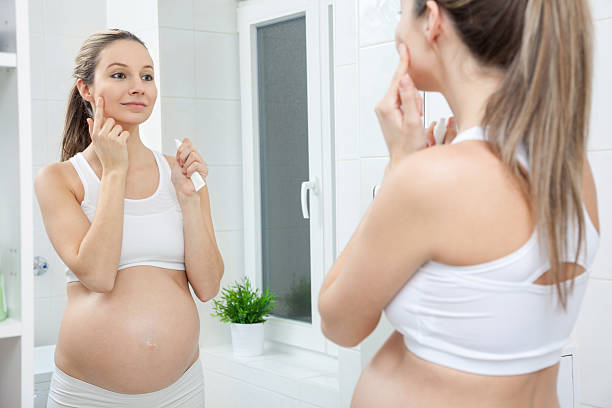As a woman, it’s hard not to be concerned about your appearance, especially during pregnancy. While many women may want to maintain their youthful look, the question of whether or not it’s safe to get Botox while pregnant is a complex one. With so much conflicting information online, it can be challenging to determine what’s best for you and your baby. In this article, we’ll explore the issue in-depth and provide you with everything you need to know.
Can You Get Botox While Pregnant?
Botox is a neurotoxin that can cross the placenta and potentially affect the developing fetus. There is not enough research on the safety of Botox during pregnancy, so it is best to err on the side of caution and avoid it.
The American College of Obstetricians and Gynecologists recommends avoiding non-essential medications, including Botox, during pregnancy. Additionally, the U.S. Food and Drug Administration (FDA) classifies Botox as a category C drug, which means that animal studies have shown adverse effects on fetuses, but no human studies have been conducted.
Dr. Michele Green, a dermatologist in New York City, said in an interview with RealSelf in 2020 that “Botox is not safe to use during pregnancy. It is a neurotoxin that can cross the placenta and potentially affect the developing fetus.”
Women who have a history of miscarriage, preterm birth, or other complications during pregnancy should avoid Botox injections altogether, as it could exacerbate any existing conditions.
What Are the Risks of Getting Botox While Pregnant?
Although there have been no human studies that conclusively state that Botox is dangerous during pregnancy, there is a range of potential risks. Here are some of the most significant risks:
Birth Defects
Botox, which contains botulinum toxin, has the potential to cross the placenta and reach the developing fetus. Exposure to this toxin during pregnancy may increase the risk of birth defects in the unborn child. While the specific risk and types of birth defects are not well-documented due to ethical considerations (studies on pregnant women are limited), caution is advised.
Miscarriage
There is a theoretical risk that Botox could increase the risk of miscarriage. However, this risk has not been extensively studied or definitively established. Given the uncertainties, healthcare professionals typically advise against Botox injections during pregnancy to err on the side of caution.
Premature Birth
Some concerns exist regarding the potential for Botox to induce premature labor or contribute to preterm birth. The precise mechanisms are not fully understood, but it is generally recommended to avoid any unnecessary procedures during pregnancy, including elective cosmetic treatments like Botox.
Low Birth Weight
Botox exposure during pregnancy may also be associated with an increased risk of low birth weight in newborns. Low birth weight can be a concern because it may lead to health issues and developmental challenges for the baby.
When Should You Consider Getting Botox after giving birth?
If you’re willing to hold off on Botox, it’s always best to consult with your obstetrician first. They will be able to provide you with personalized advice based on your medical history and any existing conditions.
You can consider getting Botox after giving birth once you are no longer breastfeeding and your hormones have settled back to normal, because there is not enough research on the safety of Botox during breastfeeding. This can take anywhere from a few weeks to a few months.
Additionally, take into account the impact of hormonal fluctuations that occur after giving birth. These hormonal changes can influence how your body responds to Botox injections. Waiting until your hormones have stabilized and returned to normal levels is advisable. Moreover, your overall lifestyle, including factors like breastfeeding and your baby’s sleep patterns, can play a role in your decision. Delaying Botox until you’ve ceased breastfeeding and your baby is sleeping through the night can provide you with the necessary time to rest and recover following the procedure, enhancing your overall experience and results. Always discuss your plans with your healthcare provider to make well-informed decisions about the timing of Botox treatment post-pregnancy.
what to do instead of botox during pregnancy
Topical Products
Look for skincare products containing ingredients like hyaluronic acid, retinol, and peptides. Hyaluronic acid provides hydration and plumpness to the skin, retinol promotes skin renewal and collagen production, while peptides help reduce the appearance of fine lines and wrinkles. Consult with a dermatologist to select products suitable for your skin type and pregnancy.
Microneedling
Microneedling is a minimally invasive cosmetic procedure that involves the use of tiny needles to create controlled micro-injuries in the skin’s surface. This process stimulates the body’s natural healing response, leading to the production of new collagen and elastin fibers. Microneedling can help diminish the appearance of fine lines, wrinkles, and scars. It is considered safe during pregnancy when performed by a qualified professional who is aware of your pregnancy status.
Chemical Peels
Chemical peels can help reduce fine lines, improve skin texture, and address pigmentation issues. You should choose a gentle chemical peel and ensure it is administered by a licensed skin care professional with experience in pregnancy-safe treatments.
HydraFacial
A HydraFacial is a non-invasive facial treatment that combines cleansing, exfoliation, extraction, and hydration. This treatment can enhance skin radiance and address common skin concerns, all without the need for injections. HydraFacial is generally considered safe during pregnancy, but it’s best to inform your skincare provider of your pregnancy to tailor the treatment accordingly.
tips for improving the appearance of your skin during pregnancy
- Eating a healthy diet will give your skin the nutrients it needs to stay healthy and radiant. Make sure to eat plenty of fruits, vegetables, and whole grains.
- Staying hydrated is important for overall health and well-being, and it can also help to improve the appearance of your skin. Aim to drink 8 glasses of water per day.
- Exercise is good for your overall health and well-being, and it can also help to improve the appearance of your skin. Aim for at least 30 minutes of moderate-intensity exercise most days of the week.
- Stress can take a toll on your skin, making it look dull and tired. Find healthy ways to manage stress, such as exercise, yoga, or meditation.
FAQs
- Can I consult with a dermatologist during pregnancy for skincare recommendations? Yes, consulting with a dermatologist during pregnancy is advisable to discuss skincare products and treatments that are safe and suitable for your specific skin type and pregnancy status. They can provide personalized recommendations.
- What should I do if I’ve already had Botox injections and discover I’m pregnant? If you’ve recently had Botox injections and discover you’re pregnant, it’s essential to inform your healthcare provider. They can assess your situation and provide guidance based on your individual circumstances.
- Can you get botox while breastfeeding? There is limited research on the safety of Botox during breastfeeding, so it is generally recommended to wait until you have ceased breastfeeding before considering Botox injections. Consult with your healthcare provider for personalized advice.
- Are there any skincare products I should avoid during pregnancy? Certain skincare ingredients, like retinoids and some chemical sunscreens, are best avoided during pregnancy. Always consult with a dermatologist to identify pregnancy-safe skincare products and ingredients
Final Takeaway
It’s crucial to prioritize your health and that of your baby’s during pregnancy. While getting Botox may seem like a quick fix to maintain your youthful appearance, it’s not worth risking potential harm to your child. So, can you get Botox while pregnant? The answer is not entirely clear, but it’s always best to err on the side of caution.







